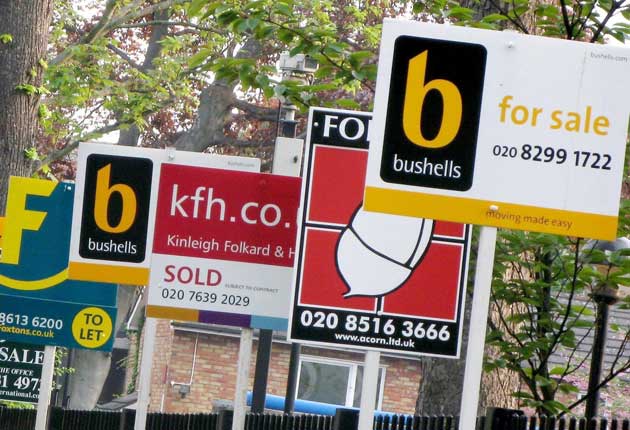Supply shortage helps boost house prices

Your support helps us to tell the story
From reproductive rights to climate change to Big Tech, The Independent is on the ground when the story is developing. Whether it's investigating the financials of Elon Musk's pro-Trump PAC or producing our latest documentary, 'The A Word', which shines a light on the American women fighting for reproductive rights, we know how important it is to parse out the facts from the messaging.
At such a critical moment in US history, we need reporters on the ground. Your donation allows us to keep sending journalists to speak to both sides of the story.
The Independent is trusted by Americans across the entire political spectrum. And unlike many other quality news outlets, we choose not to lock Americans out of our reporting and analysis with paywalls. We believe quality journalism should be available to everyone, paid for by those who can afford it.
Your support makes all the difference.House prices rose for the fifth month in a row during November as the market continued to be boosted by a shortage of homes for sale, figures showed today.
The average cost of a home rose by 1.4 per cent during the month to stand at £167,664, the highest level since October 2008, according to Halifax.
But the group warned that the prospects for the market going forward depended on the state of the economy and whether there was a significant increase in the number of homes put up for sale.
It added that it expects house prices to remain flat during 2010.
House prices are now 4.2 per cent higher than they were at the beginning of the year and rising at their fastest rate since November 2006, according to the three-month on three-month trend, which is generally seen as a less volatile indicator of underlying market conditions.
The annual rate at which prices are falling has continued to drop to just 1.6 per cent - based on prices during the three months to the end of November compared with the same period a year earlier - well down on the peak of 17.7 per cent in April this year.
Martin Ellis, Halifax housing economist, said: "The recovery in house prices since the spring has been driven by increased demand for property, largely due to the improvement in affordability for existing homeowners and first-time buyers who can raise the necessary deposit.
"Somewhat higher demand has combined with a low level of properties available for sale to push up prices," he said.
But rising house prices has led to a further increase in the house price to earnings ratio - a key measure of affordability - with this rising further above the long-term average of four to 4.68 during November.
The Halifax figures contrast with ones released by Nationwide for November, which showed a slowdown in the rate at which house prices are increasing.
Nationwide reported a 0.5 per cent rise during the month, the smallest increase since prices stopped falling in April.
Howard Archer, chief UK and European economist at IHS Global Insight, said: "Despite the further significant rise in house prices reported by the Halifax in November, we remain sceptical that the house price rally seen since early-2009 can be sustained for much longer.
"Consequently, while house prices may well rise further in the near term from their early-2009 lows, we suspect that they they will be prone to relapses in 2010."
He expects house prices to fall by at least 5 per cent next year.
Seema Shah, property economist at Capital Economics, said: "The continued rebound in house prices is hard to reconcile with the weak economic backdrop, the still-tight mortgage lending criteria and the fact that the market remains overvalued.
"As a result, once the shortage of property on the market eases, we suspect that house prices will fall again."
But Simon Rubinsohn, chief economist at the Royal Institution of Chartered Surveyors, is more optimistic.
He said: "Despite the probable ending of the extended zero rate band for stamp duty at the end of the year, the likelihood is that prices will continue to rise in the early part of 2010.
"Although the fresh supply of property is beginning to pick up, it is continuing to lag behind the increase in buyer interest which suggests that, at least in the near term, the market will continue to tighten."
Join our commenting forum
Join thought-provoking conversations, follow other Independent readers and see their replies
Comments